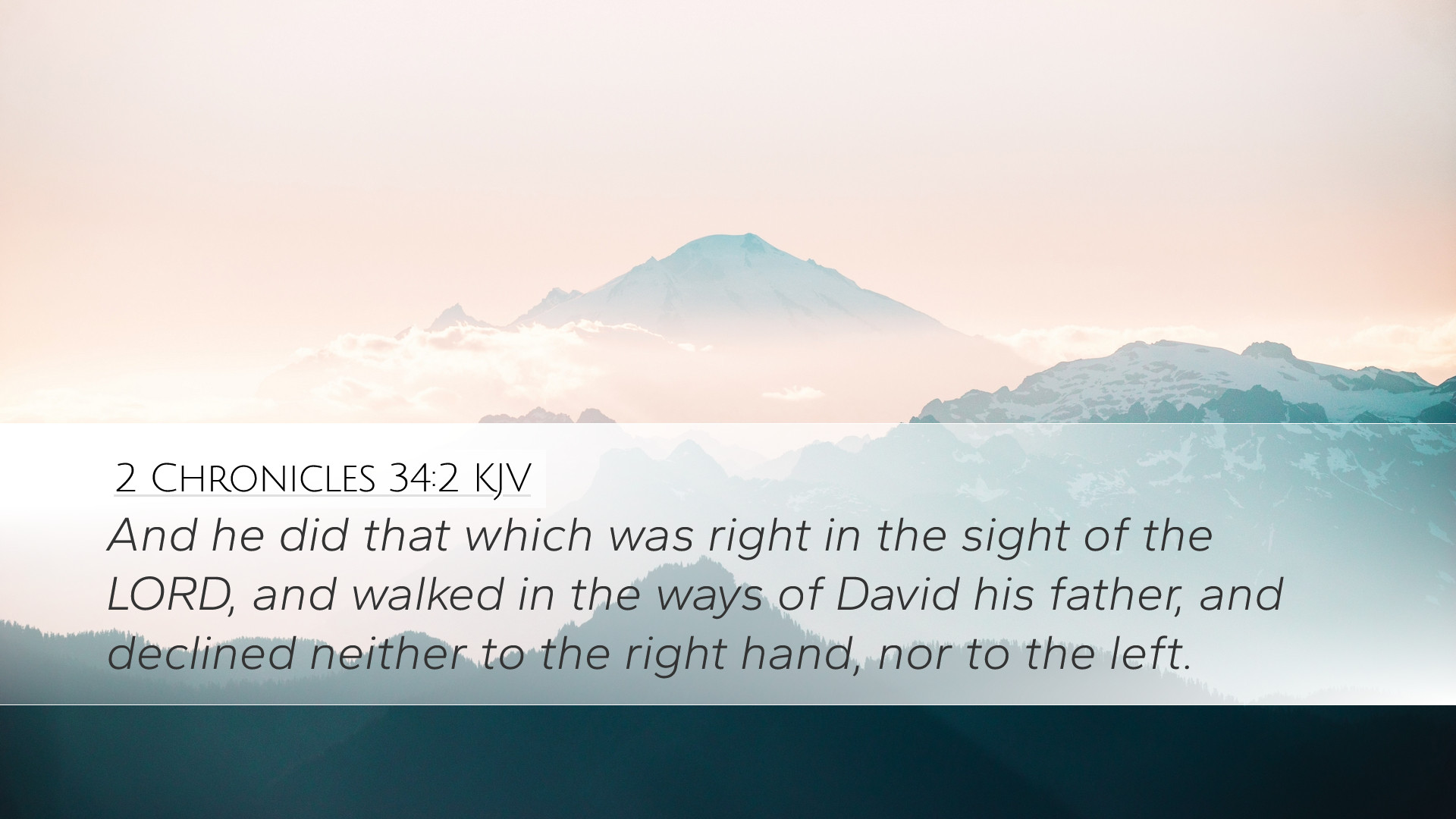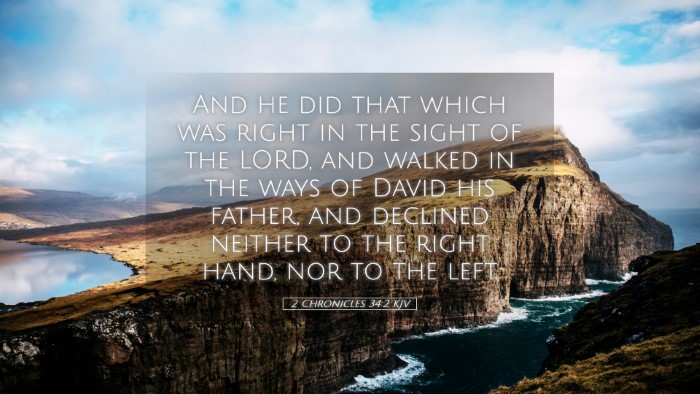Commentary on 2 Chronicles 34:2
2 Chronicles 34:2: "And he did that which was right in the sight of the LORD, and walked in the ways of David his father, and declined neither to the right hand, nor to the left."
Introduction
This verse summarizes the character and actions of King Josiah of Judah, a pivotal figure in the history of Israel. His reign is noted for a significant religious reform and the restoration of true worship. This commentary draws insights from public domain commentaries to provide a comprehensive understanding of this passage.
Contextual Background
Josiah came to the throne at a young age, inheriting a kingdom that had largely deviated from the worship of Yahweh. His reign occurred during a period of moral and spiritual decay in Judah, following the earlier reigns of kings who had led Israel into idolatry and away from the true worship of God.
Historical Setting
According to Matthew Henry, the backdrop of 2 Chronicles shows a nation under the influence of previous ungodly kings such as Ammon and Manasseh. This context highlights the importance of Josiah's actions and decisions during his reign, which aimed to reverse the idolatrous practices that had permeated the land.
Analysis of Josiah's Character
The verse highlights several aspects of Josiah's character and reign:
-
Righteousness:
Josiah is noted for doing "that which was right in the sight of the LORD." Albert Barnes comments that righteousness in this context involves not merely ceremonial observance but a genuine commitment to the ethical and moral laws as outlined in the Torah.
-
Faithfulness to Ancestors:
He "walked in the ways of David his father," illustrating a deliberate choice to emulate the faithfulness of David. Adam Clarke emphasizes the significance of this reference to David, suggesting that Josiah’s actions were a restoration to the covenantal practices established by Israel’s most revered king.
-
Steadfastness:
Josiah "declined neither to the right hand, nor to the left," which signifies his unwavering commitment to God's commands. This steadfastness is a model for leaders, reflecting a focused and determined adherence to God's will without compromise or deviation in the face of societal pressures.
Theological Implications
The actions of Josiah have significant theological implications for believers and church leaders:
-
Righteous Leadership:
The righteousness of a leader sets the spiritual tone for a nation or community. The example of Josiah serves as a reminder for pastors and theologians to lead with integrity and faithfulness to God's Word.
-
Importance of Heritage:
Emulating godly leaders (like David) can inspire a return to faithful practices. The reverence for heritage in faith emphasizes the continuity of God's work through generations, a point duly noted by Barnes in relation to the importance of maintaining sound doctrine informed by historical understanding.
-
Perseverance in Faith:
Josiah's avoidance of the extremes in worship and practice is a testament to the need for balance in Christian living. Clarke suggests that believers today are called to navigate challenges with a focus on the core of their faith, avoiding legalism on one side and libertinism on the other.
Practical Applications
For pastors, theologians, and students of the Word, Josiah's reign provides a rich source of practical applications:
-
Commitment to Scripture:
Josiah's reforms, which began with the rediscovery of the Law, underline the necessity of grounding any renewal in the Scriptures. This serves as a call for contemporary believers to be dedicated to the study and application of Biblical truth in their lives.
-
Influence of Youthful Leaders:
Josiah ascended the throne at a young age, illustrating that even those who are young can have a profound impact. This encourages churches to empower and mentor young leaders, entrusting them with responsibilities for spiritual growth and direction.
-
Corporate Repentance:
The context leading to Josiah's reforms illustrates the importance of collective repentance and a return to God. This serves as a challenge for congregations to pursue corporate confession and renewal in today's context, recognizing that societal issues often reflect broader spiritual realities.
Conclusion
2 Chronicles 34:2 offers a concise yet profound insight into one of Israel's most righteous kings, providing a model for integrity, faithfulness, and godly leadership. The reflections drawn from public domain commentaries enrich our understanding of this passage and highlight the applicable lessons for today's believers. The character of Josiah serves not only as a historical account but as a guiding example for future generations in their pursuit of holiness and truth in their relationship with God.


